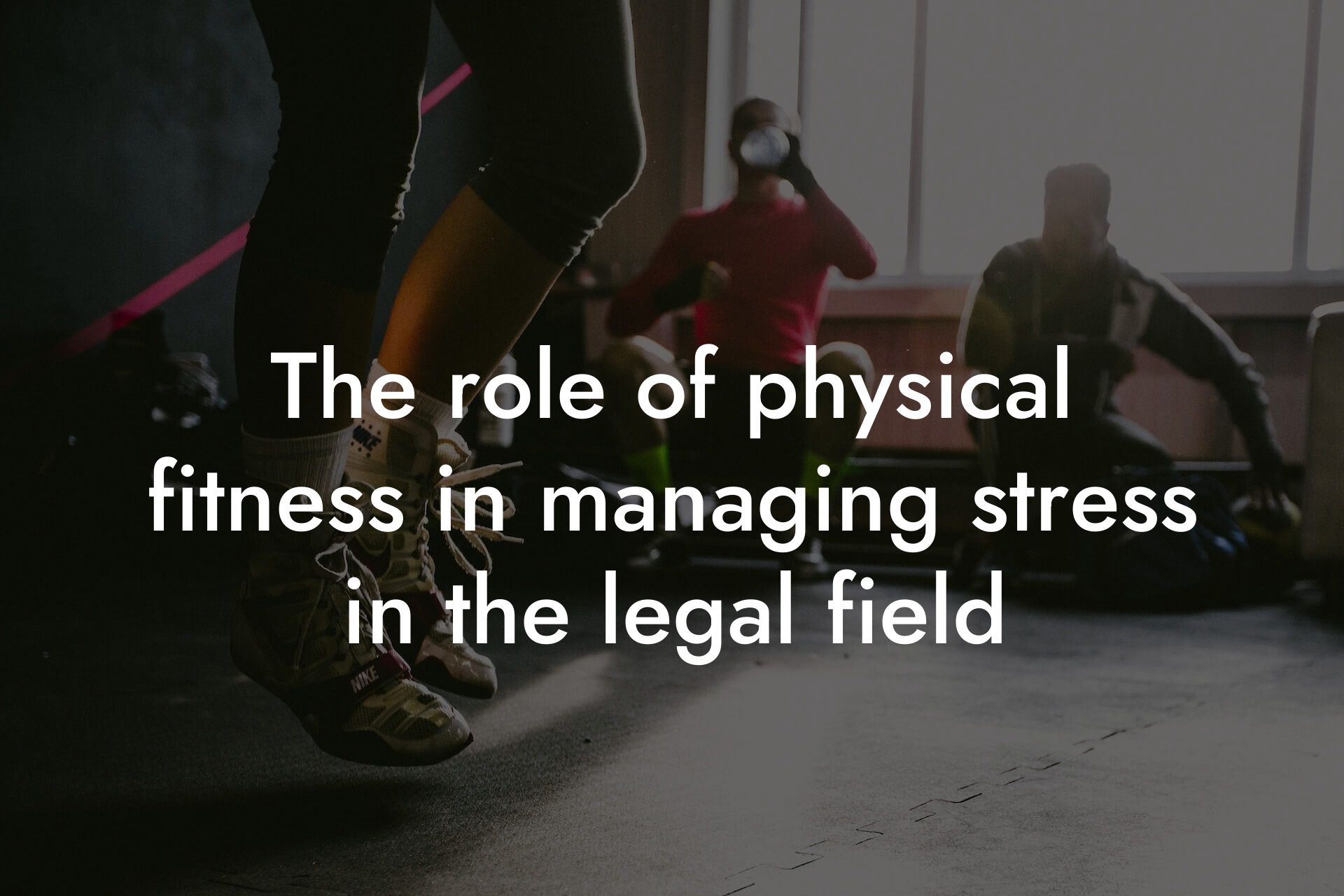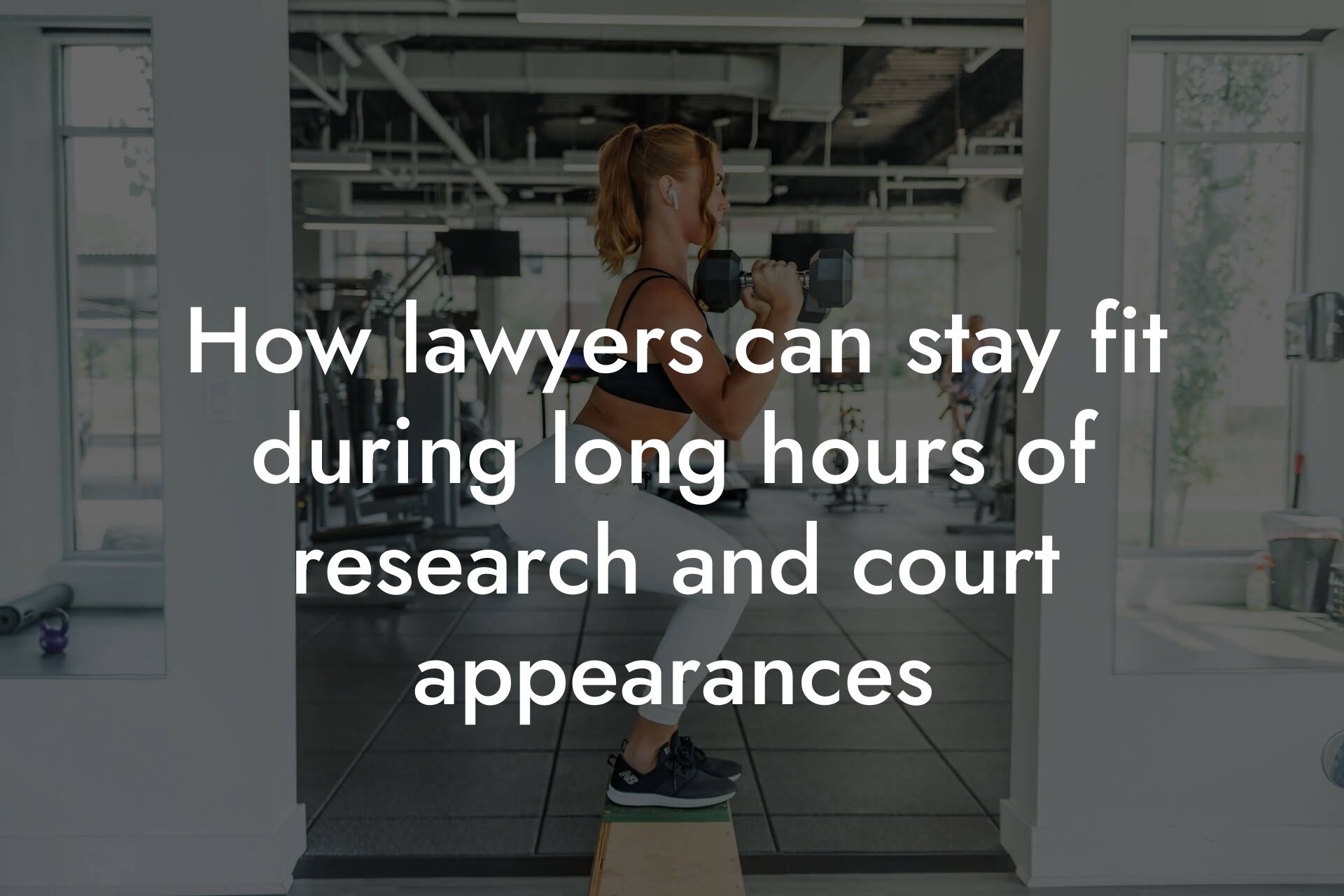As a high-earning professional in the legal industry, you're no stranger to long hours, high stakes, and intense pressure to perform. However, this demanding lifestyle can take a toll on your physical and mental health, leading to burnout. Burnout is a state of emotional, mental, and physical exhaustion caused by prolonged stress, overwork, and lack of balance in life. It can result in decreased productivity, poor job satisfaction, and a higher risk of chronic diseases. Fortunately, incorporating physical activity into your daily routine can help prevent burnout and improve overall well-being.
Table of Contents
- The Prevalence of Burnout in the Legal Industry
- The Consequences of Burnout on Physical Health
- The Role of Physical Activity in Preventing Burnout
- Benefits of Exercise for Law Professionals
- Types of Exercise Suitable for Law Professionals
- Creating a Workout Routine as a Law Professional
- Frequently Asked Questions
The Prevalence of Burnout in the Legal Industry
Studies have shown that lawyers are at a higher risk of burnout compared to other professionals. A survey by the American Bar Association found that 61% of lawyers reported feeling burned out, with 45% experiencing severe burnout. The legal industry's fast-paced and competitive nature, combined with the pressure to bill hours and meet deadlines, can lead to chronic stress and exhaustion.
The Consequences of Burnout on Physical Health
Burnout can have severe consequences on physical health, including:
- Cardiovascular disease: Chronic stress can increase blood pressure, heart rate, and cardiovascular disease risk.
- Digestive problems: Burnout can lead to irritable bowel syndrome, acid reflux, and stomach ulcers.
- Sleep disturbances: Stress and anxiety can disrupt sleep patterns, leading to insomnia, fatigue, and mood disturbances.
- Weakened immune system: Chronic stress can suppress the immune system, making you more susceptible to illnesses.
The Role of Physical Activity in Preventing Burnout
Regular physical activity is a powerful tool in preventing burnout. Exercise can:
- Reduce stress and anxiety: Physical activity stimulates the production of endorphins, which are natural mood-boosters.
- Improve sleep quality: Regular exercise can help regulate sleep patterns and improve sleep quality.
- Increase energy levels: Physical activity can increase energy levels and reduce fatigue.
- Enhance cognitive function: Exercise has been shown to improve concentration, memory, and problem-solving skills.
Benefits of Exercise for Law Professionals
In addition to reducing burnout, exercise can have specific benefits for law professionals, including:
- Improved focus and concentration: Regular physical activity can improve cognitive function, allowing you to stay focused and concentrated during long hours of work.
- Enhanced creativity: Exercise has been shown to improve creative thinking and problem-solving skills, which are essential for legal professionals.
- Better time management: Regular physical activity can help you prioritize tasks and manage your time more effectively.
- Increased confidence: Exercise can boost self-confidence, which is critical for success in the legal industry.
Types of Exercise Suitable for Law Professionals
As a busy law professional, it can be challenging to find time for exercise. However, there are various types of physical activity that can be incorporated into your daily routine, including:
- High-intensity interval training (HIIT): Short, intense workouts that can be done in as little as 20 minutes.
- Yoga and Pilates: Low-impact exercises that can improve flexibility, balance, and strength.
- Brisk walking: A low-impact exercise that can be done during lunch breaks or after work.
- Resistance training: Weightlifting or bodyweight exercises that can improve muscle strength and endurance.
Creating a Workout Routine as a Law Professional
To incorporate physical activity into your daily routine, follow these tips:
- Start small: Begin with short, manageable workouts and gradually increase duration and intensity.
- Schedule it: Treat exercise as a non-negotiable part of your daily routine, just like work or family commitments.
- Find an exercise buddy: Having a workout partner can increase motivation and accountability.
- Mix it up: Vary your workout routine to avoid boredom and prevent plateaus.
As a law professional, you understand the importance of taking care of your physical and mental health. Incorporating physical activity into your daily routine can help prevent burnout, improve overall well-being, and increase productivity. By understanding the consequences of burnout and the benefits of exercise, you can take the first step towards creating a healthier, more balanced lifestyle. Remember, taking care of your physical health is essential to achieving success in the legal industry.
At Tano Performance Group, we understand the importance of physical activity in preventing burnout. Our DEXA machine provides a comprehensive body assessment, giving you the information you need to take control of your physical health. By combining regular exercise with a healthy diet and lifestyle, you can achieve optimal physical performance and reduce the risk of burnout.
Frequently Asked Questions
What is burnout, and how does it affect lawyers?
Burnout is a state of emotional, mental, and physical exhaustion caused by prolonged stress, overwork, and lack of balance in life. Lawyers are particularly susceptible to burnout due to the high demands of their profession, including long hours, intense pressure to meet deadlines, and the emotional toll of dealing with complex and often traumatic cases. Burnout can lead to decreased productivity, poor mental health, and a higher risk of chronic diseases.
How common is burnout among lawyers?
Burnout is a significant problem in the legal profession. According to a recent study, approximately 45% of lawyers experience burnout, with 70% reporting feeling unhappy or unfulfilled in their careers. This is significantly higher than the general population, highlighting the need for lawyers to prioritize their well-being and take proactive steps to prevent burnout.
What are the physical symptoms of burnout?
The physical symptoms of burnout can be subtle at first but can quickly escalate if left unaddressed. Common physical symptoms include chronic fatigue, insomnia, headaches, digestive problems, and a weakened immune system. If you're experiencing any of these symptoms, it's essential to take a step back and assess your workload, stress levels, and overall well-being.
How does physical activity help prevent burnout?
Regular physical activity is a powerful tool in preventing burnout. Exercise reduces stress and anxiety by releasing endorphins, also known as "feel-good" hormones. Physical activity also improves sleep quality, boosts energy levels, and enhances cognitive function, all of which are critical for maintaining a healthy work-life balance. Additionally, exercise provides a much-needed break from the demands of work, allowing lawyers to recharge and refocus.
What types of physical activity are most beneficial for lawyers?
Any form of physical activity can be beneficial for lawyers, but activities that promote relaxation and stress reduction are particularly effective. Yoga, Pilates, and tai chi are excellent choices, as they combine physical movement with mindfulness and deep breathing techniques. Cardio exercises like running, cycling, or swimming can also be beneficial, as they release endorphins and improve mood. Ultimately, the best activity is one that you enjoy and can commit to regularly.
How much physical activity do lawyers need to prevent burnout?
The American Heart Association recommends at least 150 minutes of moderate-intensity aerobic exercise or 75 minutes of vigorous-intensity aerobic exercise per week. However, even small amounts of physical activity can be beneficial. Lawyers can start with short, manageable sessions, such as 10-15 minute walks during lunch breaks or 30-minute yoga sessions after work. Consistency is key, so aim to incorporate physical activity into your daily routine.
Can physical activity really reduce stress and anxiety?
Absolutely! Exercise has been shown to reduce stress and anxiety by activating the body's natural relaxation response. Physical activity stimulates the production of neurotransmitters like serotonin and dopamine, which help regulate mood and reduce symptoms of anxiety and depression. Regular exercise can also improve self-esteem, confidence, and overall mental well-being.
How can lawyers fit physical activity into their busy schedules?
Fitting physical activity into a busy schedule can be challenging, but there are ways to make it work. Lawyers can start by scheduling exercise into their daily planners, just as they would any other important appointment. They can also try to incorporate physical activity into their daily commute, such as taking the stairs instead of the elevator or walking to work instead of driving. Even small amounts of physical activity, such as stretching or jumping jacks during commercial breaks, can be beneficial.
What are some common barriers to physical activity among lawyers?
Common barriers to physical activity among lawyers include lack of time, fatigue, and prioritizing work over personal well-being. Lawyers may also feel self-conscious about their physical appearance or ability, or they may have underlying health conditions that make exercise more challenging. It's essential to recognize these barriers and develop strategies to overcome them, such as finding a workout buddy or seeking support from a healthcare professional.
How can lawyers overcome the fear of taking time off for physical activity?
Lawyers often feel pressure to be constantly available and responsive to clients, making it difficult to take time off for physical activity. However, it's essential to recognize that taking breaks and prioritizing self-care is critical to maintaining productivity and performance in the long run. Lawyers can start by communicating with their clients and colleagues about their needs, setting realistic boundaries, and finding creative ways to incorporate physical activity into their daily routine.
What role does nutrition play in preventing burnout?
Nutrition plays a critical role in preventing burnout. A balanced diet that includes plenty of fruits, vegetables, whole grains, and lean protein sources can help support energy levels, mood, and cognitive function. Lawyers should aim to limit their intake of processed foods, sugar, and caffeine, which can exacerbate burnout symptoms. Staying hydrated by drinking plenty of water is also essential.
How can lawyers prioritize self-care and prevent burnout?
Prioritizing self-care is critical to preventing burnout. Lawyers can start by setting realistic goals and boundaries, learning to say "no" to excessive workload, and taking regular breaks throughout the day. They should also prioritize activities that bring them joy and fulfillment outside of work, such as hobbies, spending time with loved ones, or pursuing creative interests. Regular exercise, healthy nutrition, and sufficient sleep are also essential components of a self-care routine.
What are some common myths about burnout and physical activity?
One common myth is that burnout is a personal failing or a sign of weakness. However, burnout is a common experience that can affect anyone, regardless of their profession or circumstances. Another myth is that physical activity is a luxury that lawyers can't afford, but the reality is that exercise is a critical component of maintaining productivity, performance, and overall well-being.
How can lawyers find time for physical activity during the workday?
Lawyers can find time for physical activity during the workday by incorporating short bursts of exercise into their routine, such as taking the stairs instead of the elevator, doing desk stretches, or going for a short walk during lunch breaks. They can also try to schedule exercise into their daily planners, just as they would any other important appointment.
What are some tips for lawyers who are new to physical activity?
For lawyers who are new to physical activity, it's essential to start slowly and set realistic goals. Begin with short, manageable sessions, and gradually increase the intensity and duration as you become more comfortable. Find an exercise buddy or workout partner to provide motivation and accountability. Most importantly, focus on finding activities that you enjoy, and don't be too hard on yourself if you miss a session or two.
How can lawyers measure the impact of physical activity on their well-being?
Lawyers can measure the impact of physical activity on their well-being by tracking their progress, such as monitoring their exercise frequency, intensity, and duration. They can also pay attention to changes in their physical symptoms, such as improved sleep quality, increased energy levels, or reduced stress and anxiety. Regular self-assessments and check-ins with a healthcare professional can also help lawyers gauge the effectiveness of their physical activity routine.
What are some resources available to lawyers who want to prioritize physical activity and prevent burnout?
There are many resources available to lawyers who want to prioritize physical activity and prevent burnout. The American Bar Association offers wellness initiatives and resources specifically designed for lawyers. Additionally, many gyms and fitness studios offer classes and programs tailored to busy professionals. Online resources, such as fitness apps and wellness blogs, can also provide valuable guidance and support.
How can lawyers make physical activity a sustainable part of their lifestyle?
To make physical activity a sustainable part of their lifestyle, lawyers should focus on finding activities that they enjoy and can commit to in the long term. They should also try to incorporate physical activity into their daily routine, such as scheduling exercise into their daily planners or finding ways to make physical activity a social activity. Finally, lawyers should celebrate their successes and don't be too hard on themselves if they miss a session or two.
What is the long-term impact of physical activity on lawyers' careers?
The long-term impact of physical activity on lawyers' careers can be significant. Regular exercise can improve cognitive function, boost energy levels, and enhance overall well-being, leading to increased productivity and performance. Physical activity can also reduce the risk of chronic diseases, such as heart disease and diabetes, which can impact a lawyer's ability to practice law. By prioritizing physical activity, lawyers can maintain a healthy and successful career over the long term.
How can lawyers involve their colleagues and friends in their physical activity routine?
Lawyers can involve their colleagues and friends in their physical activity routine by inviting them to join a fitness class, going for a walk or run together during lunch breaks, or participating in a charity event or fundraiser. This can help create a sense of community and accountability, making it more likely that lawyers will stick to their physical activity routine.
What is the role of mindfulness in preventing burnout among lawyers?
Mindfulness plays a critical role in preventing burnout among lawyers. Mindfulness practices, such as meditation and deep breathing, can help reduce stress and anxiety, improve focus and concentration, and enhance overall well-being. By incorporating mindfulness into their daily routine, lawyers can better manage the demands of their profession and maintain a healthy work-life balance.
Here are some related articles you might love...
- The role of physical fitness in managing stress in the legal field
- How regular DEXA scans can benefit legal professionals
- How lawyers can stay fit during long hours of research and court appearances
- Strategies for staying active during long depositions
- How physical health can improve client interactions
- Nutrition tips for lawyers during trial season
- The impact of body composition on cognitive function in law
- Maintaining fitness during intense case work
- Quick exercise routines for legal professionals with busy schedules
Zak Faulkner
Zak Faulkner is a leading authority in the realm of physical health and body composition analysis, with over 15 years of experience helping professionals optimise their fitness and well-being. As one the experts behind Tano Performance Group, Zak has dedicated his career to providing in-depth, science-backed insights that empower clients to elevate their physical performance and overall health.
With extensive knowledge of DEXA technology, Zak specializes in delivering comprehensive body assessments that offer precise data on body fat, muscle mass, bone density, and overall physique. His expertise enables individuals to make informed decisions and achieve their fitness goals with accuracy and confidence. Zak’s approach is rooted in a deep understanding of human physiology, combined with a passion for helping clients unlock their full potential through personalised strategies.
Over the years, Zak has earned a reputation for his commitment to excellence, precision, and client-focused service. His guidance is trusted by top professionals who demand the best when it comes to their health. Whether advising on fitness programs, nutritional strategies, or long-term wellness plans, Zak Faulkner’s insights are a valuable resource for anyone serious about taking their health and fitness to the next level.
At Tano Performance Group, Zak continues to lead our Content Team revolutionising how professionals approach their physical health, offering unparalleled expertise that drives real results.




